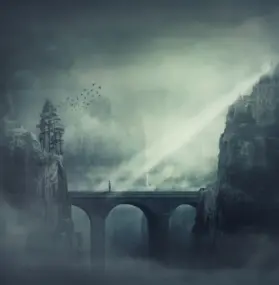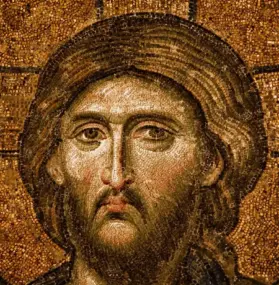- by Carrie Shaw
- on September 17, 2025
(Not a reader? Take a listen instead ⇓)
The sovereignty and rule of God has always existed and will always exist (Psalm 47:7, 1 Chronicles 29:11, Exodus 15:18, Psalm 103:19).
He is Almighty God, maker of the earth, sovereign over all, the King of Kings and Lord of Lords. He alone claims the title of the One and Only God and that there is none like Him in all the earth. The Psalmist declares the wonder and worthiness of this Eternal God, who is clothed in light, who stretches out the heavens like a tent, and who walks on the waves of the sea (Psalm 104:2, Job 9:8). All of creation bows in obeisance to His majesty, for all things owe their existence to Him (Psalm 104:30, Psalm 6:4, Psalm 96:11, Luke 19:40).
He is the God of promise, at whose Word the universe came into being and whose Word will never return to Him void, not accomplishing the purpose for which it was sent (Genesis 1:3, Isaiah 55:11). His loving devotion endures forever. He is faithful, true, just, and all glorious (Psalm 136:3, 1 Timothy 1:17).
His sovereignty is over and above all other kingdoms and His rule absolute (Isaiah 37:16, 1 Timothy 6:15). All the earth is His and everything that is therein (Psalm 24:1). This glorious and absolute rule and reign of the only wise and faithful King is what the New Testament terms the ‘kingdom of God’.
In The Beginning
This is the reality of the story in the beginning. Affirming God’s sovereignty gives shape and purpose to the role for which humanity was created, that is, to rule wisely and well on behalf of earth’s Sovereign.
“Then God said, “Let us make humans in our image, according to our likeness. They will rule the fish of the sea, the birds of the sky, the livestock, the whole earth, and the creatures that crawl on the earth.” | Genesis 1:26, CSB
“Yet as surely as I live and as surely as the whole earth is filled with the glory of the LORD.” | Numbers 14:21, ESV
Adam and Eve were given the authority and privilege of ruling over God’s good creation, filling all the earth with His glory and accomplishing His purpose (Genesis 1:26). However, instead of partnering with God, they choose to undertake this rule on their own terms, enacting their own will instead of the will of the Eternal One.
As a result, they experienced disruption in their relationship with the King, and the consequence of their disobedience was catastrophic. The evil of sin entered God’s good world, and would eventually spread like a dark, cancerous mass across the surface of the earth, setting in motion the destructive cycle the world has been subject to ever since.
Another kingdom was willed into existence, the kingdom of this world; earthly, transient, and dispensing death instead of life. It’s ruled over by the spirit of corruption; where envy, murder, anger, and strife find footing and flourish. It’s a dominion of darkness, from which there is no escape.
Every human is born into this kingdom, enslaved to the ruler of this world. We’re born physically alive but spiritually dead. Without our spiritual connection to the King of all the earth, we’re nothing more than ‘dead men walking’, living in darkness and far from the eternal life God intended for us.
Theocracy, Monarchy, Liberation + Redemption
For centuries, God’s story of liberation and redemption – part of His ‘Kingdom Mission’ – has been enacted in the history of the world. He wants to save and rescue His creation from this dominion of darkness, in which labour is futile and the only outcome is death.
God is for us; He loves us and wants to reconcile and transform us so that we can live the life of purpose for which He created us.
“For the creation eagerly waits with anticipation for God’s children to be revealed. For the creation was subjected to futility — not willingly, but because of him who subjected it — in the hope that the creation itself will also be set free from the bondage to decay into the glorious freedom of God’s children.” Romans 8:19-21, Christian Standard Bible
This liberation and redemption was brought into sharp relief firstly by covenants made to Abraham, through whom God promises to bless all the world (Genesis 12:1-3, Genesis 13:14-17, Genesis 15:1-21, Genesis 17:1-11).
Abraham’s twelves sons and their descendants, those who came to be known as the nation of Israel, were further witnesses to God’s promises; the people through whom all the world would come to learn of the One and Only Sovereign over all. God ruled His people at this time through theocracy, a system of law and priesthood, and the intention was that the surrounding nations would look upon His chosen people, blessed and ruled over by God, and turn to worship Him also (Isaiah 41:20, 43:10).
The nation of Israel struggled with their unique and privileged identity. They would worship and serve God for a season and then, when things were going well, they would become complacent and selfish, turning aside to worship gods made of wood and stone, like the nations around them. They abandoned their covenant with their King, over and over again, but He did not abandon them (Judges 17:6, Jeremiah 9:6).
Reestablishing His sovereignty over their lives, He reiterates His promises of liberation and freedom, through His just and righteous rulership, to the famous shepherd-boy-turned-king, David of Bethlehem. He makes David king to rule over His people, and promises that, through him and his family, He intends for all nations to find blessing and peace. Ruling by way of monarchy, the nation of Israel was to be once again a blessing to all the world and witnesses of the Creator and King of all the earth (2 Samuel 7:8-12).
The tides of human history rose and fell. Israel’s fortunes ebbed and flowed with these tides, experiencing periods of glorious peace and stability, as under King Solomon, David’s son, but, also, periods of terrible wickedness and decline. In the final days of the monarchy, Israel demonstrated a complete deterioration in both faith and witness until, finally, they were enslaved and forcibly removed from their land under Babylonian conquest and occupation (Psalm 78:10-11, Jeremiah 32:30, 2 Kings 17:18-20).
The final book of the Old Testament, Malachi, offers a glimpse into the hearts of those who had been specially chosen by God as His witnesses. Even with the perspective of their glorious history and events like the Great Exodus from Egypt, they had completely given in to apathy. They had neglected God’s promises; and spiritual lethargy and a corrupt priesthood had spread unfaithfulness, cancer-like, throughout the nation (Malachi 1-4, Ezekiel 21:27).
God reigned still but His people had long since rejected Him. The glory of His presence departed from them and would not return again for over 400 years (Ezekiel 10:15-19).
I Am
It is into this vast length of silence that the King finally speaks, announcing His impending arrival into the story of not just Israel, but the entire world (John 1:19-23,28 cp Isaiah 40:3-10). His rule and sovereignty and indeed, His purpose – that all the earth be filled with His glory – was now to be fulfilled through christocracy; a system of rulership in the name of His Son, the Christ, the Messiah.
“The people who walked in darkness have seen a great light; those who dwelt in a land of deep darkness, on them has light shone.…for to us a child is born, to us a son is given; and the government shall be upon his shoulder, and his name shall be called Wonderful Counsellor, Mighty God, Everlasting Father, Prince of Peace. Of the increase of his government and of peace there will be no end, on the throne of David and over his kingdom, to establish it and to uphold it with justice and with righteousness from this time forth and forevermore. The zeal of the LORD of hosts will do this.” | Isaiah 9:6-7, ESV
The message was clear. God was still King – He has always been King – and His reign, fractured early on in human history (Genesis 2), was going to be properly reinstated through His Son, Jesus. The Word of God had been sent out and it would not return to Him void. God’s kingdom, advancing for centuries, was now being planted right in the heart of hostile territory, ground that, in the past had not only been dangerous to the King’s messengers but, in many cases, fatal (Matthew 21:27).
The Word became human, like us. Anyone who saw him saw all the radiance of God’s glory; the exact representation of His being and the imprint of His nature (Hebrews 1:3, John 14:10-11). The glory of the King had returned to take up residence amongst His people.
Jesus, who was in the very nature of God, emptied himself and took the form of a servant, made in the likeness of humans that sin (Philippians 2:6-7). He was God-With-Us. who became the representative of us all and in his human body, the war against the ruler of this world would be waged and won.
In Jesus Christ, it would become possible for all families of the earth, of any nationality, to find liberation, redemption and experience the righteous rulership of the King of Kings.
The gospel was the announcement of good news that Jesus, God’s only Son, is both Lord and King of the kingdom and that, in him, God is saving, rescuing, atoning, justifying, ruling, and reconciling people for the glory of His name, all in pursuit of His purpose. The work that God had been at for a long time now culminated in a tiny, obscure town in the middle of the demoralised and Roman-occupied nation of Israel.
Earth in shadow, restlessly hold.
Labour’s waiting, in silent hope.
For the promise, it longs to know, what heaven holds.
Then the angels, in holy haste.
Lift their anthem, your Saviour lays,
in a manger, in humble form.
Your King is born.
Prince of Heaven | Hillsong Worship
Repent, For The Kingdom Of Heaven Is Hand
When Jesus arrived on the scene, he went and resided in the land of Naphtali, the ‘way beyond the sea’, so that the words spoken so long ago by Isaiah the prophet might be fulfilled: “the people dwelling in darkness have seen a great light, and for those dwelling in the region and shadow of death, on them a light has dawned” (Matthew 4:15-16, ESV). The implications are clearly profound, with deeply spiritual overtones. The light and life of humanity had finally arrived and the hope of liberation and redemption would be realised.
Then, he began preaching, saying “Repent, for the kingdom of heaven is at hand. Repent of your willfulness, your self-governing, your persistence in finding identity in false gods who cannot save and who do not, in reality, rule or even exist. Repent and turn to the One who rules heaven and earth, the maker and creator of all things, the King of Kings and Lord of Lords.”
“To grasp the significance of the message of the kingdom in the ministry of Jesus, we can also resort to statistical analysis. The term basileia (kingdom) occurs 162 times in the New Testament and 121 of those are in the Synoptic Gospels where the preaching of Jesus is recorded. The formula “kingdom of God” or the “kingdom of heaven” occurs 104 times in the Gospels. This message is not only the inaugural message of Jesus and the focus of His great Sermon on the Mount, it is his final message. “After he had suffered, he also presented himself alive to them by many convincing proofs, appearing during forty days and speaking about the kingdom of God” (Acts 1:3). | SBC Life
Jesus demonstrated the power and reality of the Kingdom of Heaven, through the miraculous – evidence that he was Lord of all; healing sickness, forgiving sins, multiplying bread and fishes, walking on water…raising the dead (Matthew 15:30, Matthew 14:13-33, Luke 8:49-56).
He qualified what the Kingdom of Heaven looked like; a kingdom defined by mercy and love, failure and forgiveness, exile and homecoming. The citizens of this kingdom, he said, were otherworldly; children of light and salt, whose transformed lives of goodness and steadfast confidence would witness to the glory and power of this kingdom (Matthew 5:2-11, 13-14, Luke 15:11-32).
He stated plainly the way to this kingdom; by believing in him and being born again of water and of spirit, further expanded on throughout his ministry as referring to the representative death in baptism and regeneration of new life by the Spirit (John 3:5, 16, John 8:24).
He taught that the kingdom was not in some far-off place, out of sight, but here, right now, in their midst (Luke 17:21).
“The kingdom, Jesus taught, is right here – present yet hidden, immanent yet transcendent. It is at hand – among us and beyond us, now but not yet. The kingdom of heaven, he said, belongs to the poor, the meek, the peacemakers, the merciful, and those who hunger and thirst for God. It advances not through power and might, but through missions of mercy, kindness, and humility. In this kingdom, many who are last will be first and many who are first will be last. The rich don’t usually get it, Jesus said, but children always do. This is a kingdom whose savior arrives not on a warhorse, but a donkey, not through triumph and conquest, but through death and resurrection. This kingdom is the only kingdom that will last.” | Rachel Held Evans, 1981-2019
Other places in scripture, particularly the writings of Paul the Apostle, affirm that the revelation of God’s original plan of creation, the redeeming, recreating, and re-ordering of all things, together with the reconciliation of creation to its Creator, all find their true and most meaningful significance in Jesus Christ [the King], the Word-Made-Flesh (Ephesians 1:3-10; Colossians 1:15-20; Hebrews 1:1-3; Romans 16:25-26; 1 Corinthians 8:6).
The invisible God, the King of all the earth, was now revealing Himself visibly through His Word-Made-Flesh, in whose hands the world and all that is therein, has been placed and who is Lord of all (John 3:35; Acts 2:36, Ephesians 1:10; Colossians 1:20).
The Church Of Christ Is Born
“When Jesus came preaching the Kingdom of God, he was preaching much more than personal salvation for the individual. He was preaching “a new day in an old story” – the story of God the King – and God as king in King Jesus. The one gospel is about Jesus the Lord, the King, the Messiah and the saviour. This is the story that alone makes sense of Jesus’ choice of the word ‘kingdom’ to explain the mission of God to the world.” (Scot McKnight)
When people give allegiance to Jesus the King, they are transferred out of the dominion of darkness and into the kingdom of light, the Kingdom of God that has always existed and will always exist (Colossians 1:13). To be born again is to be regenerated; the termination of people of the old creation, people enslaved to the ruler of this world, and the germination of them in the new creation with the divine life (Ephesians 4:17-24).
All of the darkness, the failure, the chaos, and ruin of our life is surrendered to the King, who erases it in the water of baptism (Matthew 3:15, Matthew 10:28, Acts 22:16, 1 Peter 3:21, Colossians 2:12, Mark 16:16, Matthew 28:19-20, Ephesians 4:4-6). Light enters the darkness. New life is ignited in us and the new human is reborn.
“The gospel of the kingdom includes the necessity of salvation since the very message begins with the call for repentance, but it goes beyond the call to salvation and includes the demand for kingdom-focused living. It insists that we are saved for a purpose.” – SBC Life
These collective ‘citizens of the Kingdom of Heaven’ are the community of believers that the New Testament calls the church, whose guiding and functioning principle is simply to incarnate Christ, the King. They are his witnesses, empowered and commissioned by him to represent him and the sovereign reign and rule of God to all the world (Acts 8:12-16,36-38, Luke 24:47).
“You will be my witnesses in Jerusalem, and in all Judea and Samaria, and to the ends of the earth.” | Acts 1:8. NIV
“Therefore go and make disciples of all nations, baptizing them in the name of the Father, and of the Son, and of the Holy Spirit.” Matthew 28:19, NIV
‘Kingdom’: King + Rule + Realm + Law + Land
- A kingdom is a people governed by a king. In truth, there is only one kingdom that reigns over all, whose king is God. He has always been king, ruling firstly through theocracy, then by monarchy and now through christocracy. The kingdom of God has gone through many phases and a reasonable chunk of the Old Testament is dedicated to the telling of this story. You can read more about this in the article ‘Jesus, King Of The World.
- The king must rule over the kingdom. In biblical language, this is always firstly redemptive, and then secondly through wise governing As Scot McKnight, historian of early Christianity, theologian, and author comments, “kingdom redemption’ is the work of God, through Jesus, and by virtue of his sin-solving cross and new-life creating resurrection, unleashed to those who are needy because of their sins. Any kind of “redemptive” activity that does not deal with sin, that does not find strength in the cross, that does not see the primary agent as Jesus, and that does not see it all as God’s new creation life unleashed is not kingdom redemption, even if it is liberating and good and for the common good.”
- There has to be people for there to be a kingdom. In the Old Testament (OT), this was the nation/kingdom of Israel. But Israel, like a tree, has deep roots and grafted-in branches, seen in the New Testament (NT) to be the church (Romans 11:1-28).
- A kingdom must have a governing law. In OT times, this was achieved through the Torah, also known as the Law of Moses. When Jesus arrived, scripture takes care to tell us that he didn’t destroy this law but fulfilled it completely. By his life, death and resurrection, a greater law came into being – the Law of Cruciformity; loving as Jesus loved. Jesus stated that the entire law of the new covenant, the law which governs people of the kingdom, is summarised in these words “Love the Lord your God with all your heart, soul, and mind. Love others as much as you love yourself” (Matthew 22:37-40).
- A kingdom must have a land. In the past, this has been, at various phases, in literal places like the Garden of Eden or the land of Israel. But right now, ‘the land’ is wherever the church (the community of kingdom people) takes up physical space. Wherever kingdom people reside, God, in Jesus, rules. One day, this ‘tree of the kingdom’ will fill all the earth and God’s rule and glory will be seen in all things – as He intended from the beginning (Numbers 14:21, Habakkuk 2:14, Matthew 6:10, Revelation 21: 1, 4, Matthew 13:31-32, Mark 4:3-32).
“[This] good news is as epic as it gets, with universal theological implications, and yet the Bible tells it from the perspective of fishermen and farmers, pregnant ladies and squirmy kids. This story about the nature of God and God’s relationship to humanity smells like mud and manger hay and tastes like salt and wine…It is the biggest story and the smallest story all at once – the great quest for the One Ring and the quiet friendship of Frodo and Sam.” | Rachel Held Evans
What About God’s Promises To Israel?
Jesus was born King, destined to inherit the ancient throne of David, his royal ancestor through his human descent. He will rule wisely and well, not just over Israel but over the whole world. Not only was he the descendant of King David and therefore the legitimate heir to the throne of Israel, he was also the Son of God and therefore the promised saviour and King of the world. The confluence of these two aspects is no coincidence and we can only be astonished at how God chose to bring all these things together to achieve His purpose.
God has in no way forgotten His promises to individuals or to groups of people and implicit in that are literal promises to the people of Israel, elements of which still await fulfillment (Isaiah 52:7-9, Luke 2:25, Acts 26:6).
“And he shall set up a banner for the nations, and shall assemble the outcasts of Israel, and gather together the dispersed of Judah from the four corners of the earth.” Isaiah 11:12, NASB
“But you, Bethlehem Ephrathah, though you are small among the clans of Judah, out of you will come for me one who will be ruler over Israel, whose origins are from of old, from ancient times.” – Micah 5:2, NIV
Jesus left his fledgling church, those first disciples who represented the expansive and diverse family that God would build through him, with a promise: that He would one day return, to take them to himself, to restore and renew all the earth, to overthrow all the different manifestations of the kingdom of this world, and to fully establish the Kingdom of God, filling the earth with His glory. Those who confess him as Lord, Saviour and Christ [King] will be saved, including those from the nation of Israel (John 14:3, Acts 1:10-11, Romans 10:9, Titus 2:13, Revelation 1:7, Romans 11:14, Ephesians 1:10, Revelation 5:13).
When he returns, to bring salvation to those who eagerly wait for him (Hebrews 9:28), Israel, the people who had been God’s witnesses, and indeed all the peoples of the earth, will hear the final entreaty of the King of Kings: “Turn to me and be saved, all you ends of the earth; for I am God, and there is no other.“
“By myself I have sworn, my mouth has uttered in all integrity a word that will not be revoked: Before me every knee will bow; by me every tongue will swear. They will say of me, ‘In the LORD alone are deliverance and strength.’ ”All who have raged against Him will come to Him and be put to shame. But all the descendants of Israel will find deliverance in the LORD and will make their boast in Him.” | Isaiah 45:22-25, NIV
One day, all the earth will be filled with the glory and sovereignty of the King of Kings and the Lord of Lords and God will once again dwell with His people. “The kingdom of the world will become the Kingdom of our Lord and of His Christ, and He will reign forever and ever” (Revelation 11:15).
What God began in the resurrection of Jesus is what He intends to do for all of creation; to regenerate, to restore, and to fully dwell with His creation in all His glorious sovereignty.
“One day the veil will be lifted; earth and heaven will be one; Jesus will be personally present, and every knee will bow at his name; creation will be renewed; the dead will be raised; and God’s new world will at last be in place, full of new prospects and possibilities.” | N T Wright
“In the days of those kings, the God of the heavens will set up a kingdom that will never be destroyed, and this kingdom will not be left to another people. It will crush all these kingdoms and bring them to an end, but will itself endure forever.” | Daniel 2:44, Christian Standard Bible






